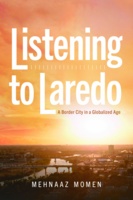The University of Arizona Press is the premier publisher of academic, regional, and literary works in the state of Arizona. They disseminate ideas and knowledge of lasting value that enrich understanding, inspire curiosity, and enlighten readers. They advance the University of Arizona’s mission by connecting scholarship and creative expression to readers worldwide.
Listening to Laredo
A Border City in a Globalized Age
Nestled between Texas and Mexico, the city of Laredo was a quaint border town, nurturing cultural ties across the river, attracting occasional tourists, and populated with people living there for generations. Mehnaaz Momen traces Laredo’s history and evolution through the voices of its people. She examines the changing economic and cultural infrastructure of the city, its interdependence with its sister city across the national boundary, and, above all, the resilience of the community as it adapts to and even challenges the national narrative on the border.
Bennu 3-D
Anatomy of an Asteroid
This book, the world’s first complete (and stereoscopic) atlas of an asteroid, is the result of a unique collaboration between OSIRIS-REx mission leader Dante Lauretta and Brian May’s London Stereoscopic Company. Lauretta’s colleagues include Carina Bennett, Kenneth Coles, and Cat Wolner, as well as Brian May and Claudia Manzoni, who became part of the ultimately successful effort to find a safe landing site for sampling. The text details the data collected by the mission so far, and the stereo images have been meticulously created by Manzoni and May from original images collected by the OSIRIS-REx cameras.
Birds of the Sun
Macaws and People in the U.S. Southwest and Mexican Northwest
The multiple vivid colors of scarlet macaws and their ability to mimic human speech are key reasons they were and are significant to the Native peoples of the U.S. Southwest and Mexican Northwest. Although the birds’ natural habitat is the tropical forests of Mexico and Central and South America, they were present at multiple archaeological sites in the region yet absent at the vast majority. Leading experts in southwestern archaeology explore the reasons why.
Urban Imaginaries in Native Amazonia
Tales of Alterity, Power, and Defiance
Featuring analysis from historical, ethnological, and philosophical perspectives, this volume dissects Indigenous Amazonians’ beliefs about urban imaginaries and their ties to power, alterity, domination, and defiance. Contributors analyze how ambiguous urban imaginaries express a singular view of cosmopolitical relations, how they inform and shape forest-city interactions, and the history of how they came into existence, as well as their influence in present-day migration and urbanization.
No Place for a Lady
The Life Story of Archaeologist Marjorie F. Lambert
Marjorie Lambert’s life story is intricately entwined in the development of archaeology in the American Southwest. In Shelby Tisdale’s compelling biography, Lambert’s work as an archaeologist, museologist, and museum curator in Santa Fe comes to life and serves as inspiration for today.
Juan Felipe Herrera
Migrant, Activist, Poet Laureate
This book is a wide-ranging collection of critical approaches on the highly accomplished poet Juan Felipe Herrera, who transcends ethnic and mainstream poetics. The chapters in this book expertly demonstrate the author’s versatility, resourcefulness, innovations, and infinite creativity.
Becoming Hopi
A History
Becoming Hopi is a comprehensive look at the history of the people of the Hopi Mesas as it has never been told before. The product of more than fifteen years of collaboration between tribal and academic scholars, this volume presents groundbreaking research demonstrating that the Hopi Mesas are among the great centers of the Pueblo world.
Where We Belong
Chemehuevi and Caxcan Preservation of Sacred Mountains
This comparative work dispels the harmful myth that Native people are unfit stewards of their sacred places. This work establishes Indigenous preservation practices as sustaining approaches to the caretaking of the land that embody ecological sustainability, spiritual landscapes, and community well-being.
Finding Right Relations
Quakers, Native Americans, and Settler Colonialism
Colonialism has the power to corrupt. This important new work argues that even the early Quakers, who had a belief system rooted in social justice, committed structural and cultural violence against their Indigenous neighbors.











